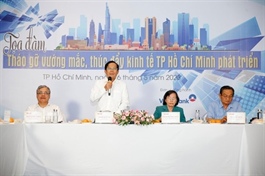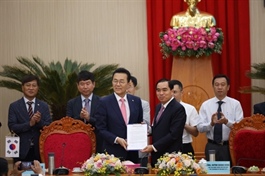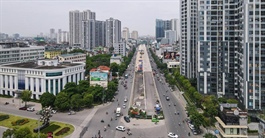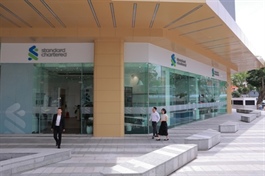John Cockerill eyes Vietnam as a new base
John Cockerill eyes Vietnam as a new base
The Prime Minister called for further investment from Belgian enterprises in Vietnam, especially in emerging sectors such as digital transformation, innovation, green transformation and circular economy.
John Cockerill, a leading Belgian enterprise, is actively exploring opportunities to expand its investment portfolio in various sectors in Vietnam, aiming to establish the country as the company's new base.
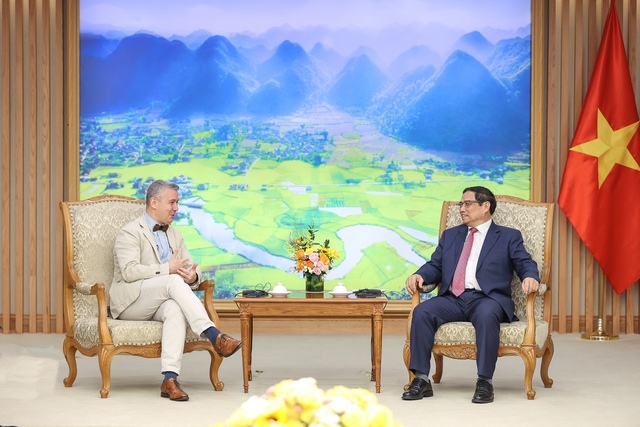
Prime Minister Pham Minh Chinh and Belgium's Ambassador to Vietnam Karl Van Den Bossche. Source: VGP |
John Cockerill CEO Francois Michel made the remarks during a meeting with Prime Minister Pham Minh Chinh on May 17.
Michel presented the current status of the Belgian group's operations in Vietnam and its plans, particularly in the energy sector, hydrogen technology and electrical machinery manufacturing.
He outlined the objective of implementing existing agreements and exploring new investment opportunities to establish Vietnam as its strong and diversified base to serve the local market and the wider region.
During their visit, the delegation conducted surveys and discussed with ministries, departments and local authorities in Vietnam. They reached an agreement on an investment plan for a factory that will produce activated carbon from coconut shells and other by-products of coconut trees in the southern province of Ben Tre.
John Cockerill also has plans to build a hydrogen plant in the southern province of Tra Vinh and work with the Ministry of National Defence to strengthen cooperation in the defense industry, Michel said.
The Prime Minister warmly welcomed and highly appreciated the John Cockerill Group's aspirations to expand its investments in Vietnam, both in terms of scale and sectors.
Stressing Vietnam's significant potential and advantages in developing renewable energy, especially wind and solar power, Chinh outlined the country's policy to promote investment in this field, based on the principle of "mutually beneficial cooperation and shared risks" between the State, enterprises, and the people.
He emphasized the consideration of all five factors: energy sources, electricity demand, distribution, utilization, and pricing, taking into account the affordability of people, enterprises, and the overall economy.
In addition, the Prime Minister highlighted the recent approval of the Power Development Plan VIII, which follows key guidelines such as "openness and dynamism" based on the prevailing situation.
"The plan prioritizes the development of renewable energy sources such as wind, solar, and hydrogen to achieve Vietnam's goal of net-zero emissions by 2050, as committed at COP26," said Chinh, who added that the plan also considers the potential for electricity exports, including the agreement with Singapore for offshore power transmission lines, in line with the trend of diversifying markets, products, and supply chains.
Chinh asked John Cockerill to consider and decide on long-term investments in Vietnam's renewable energy sector, both a strength of the Group and a significant demand in Vietnam. This includes areas such as green hydrogen production and biomass fuel.
The Prime Minister also urged the Group to strengthen cooperation and support Vietnam in policy formulation and refinement, capital raising, research and technology application, management capacity building, and human resources training in the renewable energy sector.
During the meeting, the Prime Minister reiterated Vietnam's unwavering foreign policy of independence, self-reliance, peace, cooperation, and development. He emphasized the country's commitment to building an independent and self-sufficient economy while actively engaging in comprehensive, substantive, and effective international integration.
Despite numerous challenges and limited opportunities, Vietnam has successfully maintained macroeconomic stability, controlled inflation, stimulated growth, and ensured key balances in State budget management, imports and exports, food security, energy, and labor.
He stressed that Vietnam remains an appealing investment destination amid global difficulties in attracting foreign direct investment (FDI).
To date, the country has signed 16 free trade agreements with major economies around the world and continues to negotiate more.
"The Government remains receptive to investors' opinions and closely monitors domestic and international situations to ensure appropriate policy responses," Chinh said.
Enhancing Cooperation in chip manufacturing
Speaking at the meeting, Belgian Ambassador to Vietnam Karl Van Den Bossche expressed Belgium's desire to strengthen cooperation with Vietnam in various sectors, especially as the two countries head towards the 50th anniversary of diplomatic relations.
Acknowledging that energy transition is a major challenge even for developed regions such as Europe, he commended the Vietnamese Government for issuing the Energy Development Plan VIII, which provides an important basis for enterprises to implement energy projects.
At the end of the meeting, the Prime Minister urged the Belgian Ambassador and John Cockerill to strengthen cooperation with Vietnam in chip manufacturing and innovation.
He encouraged the group to explore the establishment of an office, research facility or training center focused on hydrogen and renewable energy at the Vietnam National Innovation Center in Hoa Lac Hi-Tech Park.
The Prime Minister expressed his hope that Ambassador Karl Van Den Bossche will continue to actively promote Belgian investment in Vietnam. He also highlighted John Cockerill's extensive global network and relationships, emphasizing their role in connecting international investors to Vietnam, especially in emerging areas such as digital transformation, innovation, green transformation, circular economy, and more.
John Cockerill Group, a Belgian industrial conglomerate, specializes in mechanical engineering and provides industrial solutions in various sectors, including energy, environment, hydrogen, defense, and industrial services. In particular, the group holds a prominent position in the field of hydrogen and is one of the world's leading investment groups. In particular, they are recognized as the world leader in manufacturing hydrogen electrolyzers.
| Belgium currently ranks 23rd among 143 countries and territories investing in Vietnam. Belgian investors are running 88 projects with a total registered investment capital of nearly US$1.1 billion. The European country is Vietnam's 6th trading partner within the European Union, with a total trade turnover of US$4.5 billion. |




